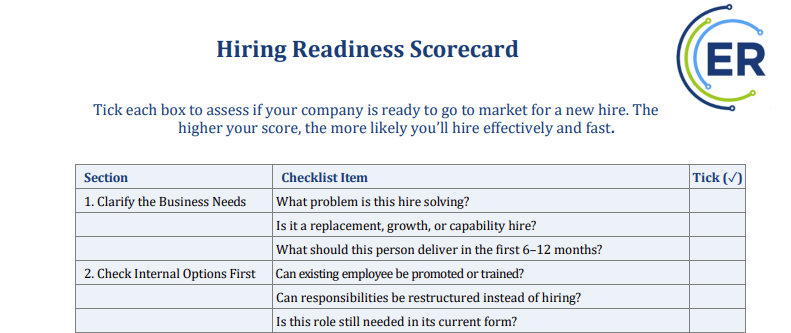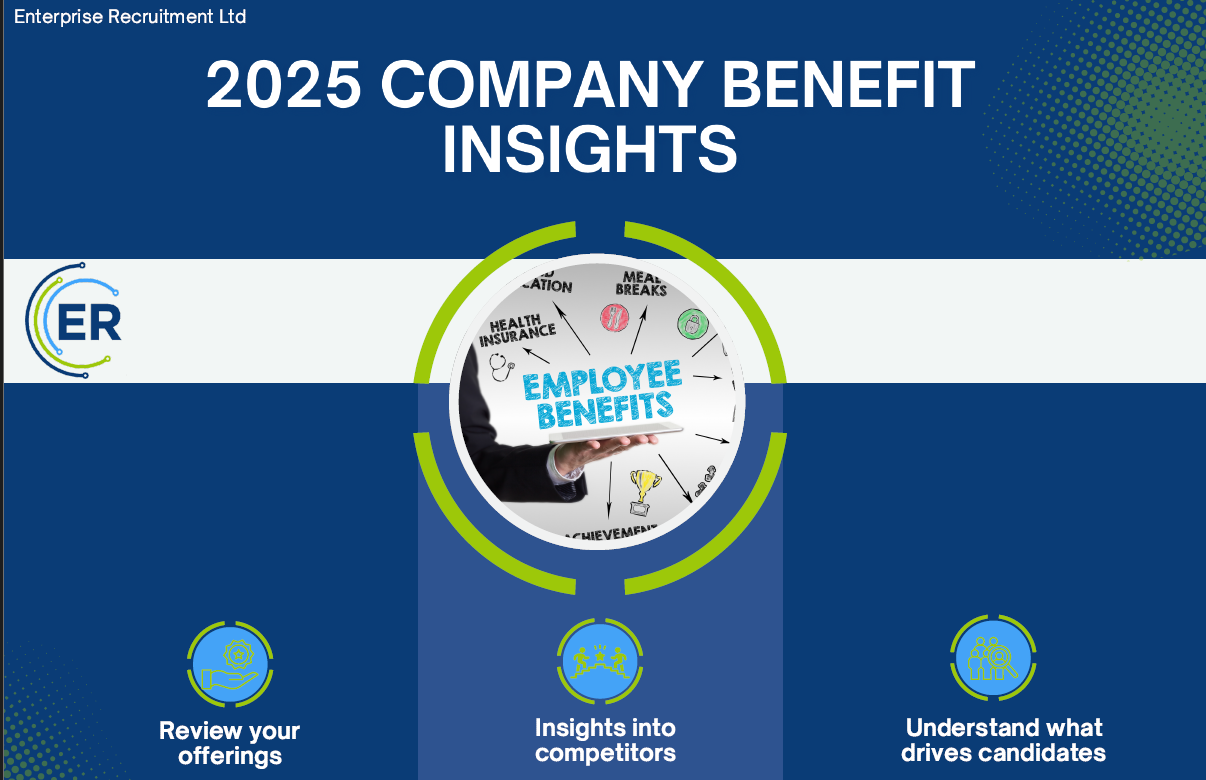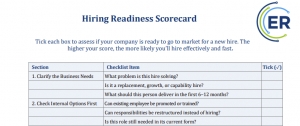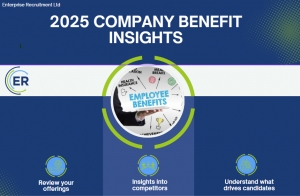Owner
The hiring readiness scorecard

Is your business ready to hire?
Hiring the right person isn't just about finding talent - it starts with being fully prepared as a busines.
This free tool works like a simple to-do list, guiding you through the key steps that make recruitment more effective such as;
- Clarify your business needs before you hire
- Align steakholders and define the role clearly
- Test your plans against market reality
- Spot any gaps that could slow down or dereail your process
The higher your score, the more ready you are to hire effectively and fast. Under 15? It’s a signal to revisit your approach before advertising.
Download the readiness score card here!
Looking for the best places in the UK to maximize your earnings as an Embedded Software Engineer?
We’ve compiled a list of the top-paying locations, along with house prices in those areas and a salary-to-house-price ratio to help you see where you can make your money go further!

Newcastle:
- Average House Price: £236,189
- Average Salary: £39,000
- House Price to Salary Ratio: 6.06
Birmingham:
- Average House Price: £230,000
- Average Salary: £41,500
- House Price to Salary Ratio: 5.54
Southampton:
- Average House Price: £290,238
- Average Salary: £42,500
- House Price to Salary Ratio: 6.84
Edinburgh:
- Average House Price: £333,315
- Average Salary: £42,000
- House Price to Salary Ratio: 7.94
Bristol:
- Average House Price 393,103
- Average Salary: £48,000
- House Price to Salary Ratio: 8.19
Oxford:
- Average House Price: £556,821
- Average Salary: £50,000
- House Price to Salary Ratio: 11.14
Cambridge:
- Average House Price: £558,980
- Average Salary: £47,500
- House Price to Salary Ratio: 11.77
London:
- Average House Price: £663,491
- Average Salary: £55,000
- House Price to Salary Ratio: 12.06
Do you want more for your money?
Let’s connect and help you get paid what you deserve!
Start exploring high-paying roles with us today!
Join a team where your work will have a direct impact on the future of aerospace defence.
This is an opportunity to join one of the most exciting young companies in the defence sector. With major backing and a fast-growing team, they are solving some of the most demanding technical challenges in aerospace — and doing it in ways that few others can match.
About the company
_______
This is a rapidly scaling organisation with a clear mission: to push the boundaries of aerospace innovation in the defence sector. Known for its pace, ambition, and ability to attract top technical talent, it offers an environment where engineers can make a meaningful impact on projects of national and global importance.
Why join?
_______
- Extremely well-funded European start-up in the defence technology sector
- Raised £130M+ in capital; one of the fastest-growing companies in Europe
- Focused on cutting-edge defensive solutions for government and allied customers
- Growing rapidly with plans to double employee count by September 2025
- Ambitious, energetic, and tech-capable culture — take ownership and help shape the next phase of growth
- Work amongst some of the best minds in engineering
The benefits of working with them
_______
- Great Salaries
- Significant equity participation for all engineers
- Private medical, dental, and optical cover (including dependants), plus cycle-to-work scheme
- The chance to shape a new team in a high-growth, well-funded environment
- All staff eligible for EMI scheme to share in the company’s success
Current opportunities
_______
- Embeded Software Engineer
- FPGA Engineer
- Mechanical Engineer
- Senio CAD Engineer
- Head of Software
What do you need?
_______
- A background or experience working in the defence industry
- Commutable or willing to reloctate to the Cambridge Area
- (Skills specific to job requirements - please ask for more information)
What are the next steps?
_______
If you are interested to learn more about these opportunties - send a copy of your CV!
Or you can give us a call on 01442 874884 to find out more!
The Hidden Costs of a Bad Hire in UK Engineering
Recruiting the wrong person in specialist engineering roles — whether that’s software, electronics, mechanical, or manufacturing — can have serious consequences for UK businesses
In these fields, where precision, innovation, and compliance are critical, one mis-hire doesn’t just cost money — it can stall product development, disrupt supply chains, and put customer relationships at risk.
How a Mis-Hire Impacts Engineering Teams
-
Project Delays – The wrong hire can slow design cycles, extend testing phases, and cause missed product launch deadlines.
-
Quality & Compliance – Errors in coding, electronics design, or manufacturing processes can lead to product failures or non-compliance with UK and international standards.
-
Team Performance – A poor fit can reduce collaboration, frustrate high-performing engineers, and lower morale across your team.
-
Financial Impact – Beyond salary, the hidden costs include lost productivity, rework, delayed revenue, and ultimately the expense of rehiring.
Reducing the Risk of a Mis-Hire
-
Define the Role Clearly – Be specific about the technical stack, industry standards, and interpersonal skills needed for success.
-
Strengthen Assessments – Use coding challenges, design reviews, or practical tests alongside structured interviews and references.
-
Balance Speed with Precision – In the UK’s engineering market, top candidates often have multiple offers. Move too slowly and you’ll lose them — but rushing risks the wrong decision.
-
Work with a Specialist Partner – At Enterprise Recruitment, we focus on engineering recruitment across software, electronics, mechanical, and manufacturing. Our networks and expertise help you find the right talent faster, while reducing the risk of costly mis-hires.
Did you know?
Average Cost of a Bad Hire:
Replacing an employee in the UK can cost between £11,200 and £74,860, depending on the role's seniority and the industry.
Impact on Productivity:
A bad hire can reduce team productivity by up to 40%, as reported by the Recruitment & Employment Confederation
Effect on Team Morale:
A bad hire can lead to a 32% reduction in team morale, disrupting team dynamics and increasing stress levels.
Cost to Replace an Employee:
The cost to replace an employee in the UK can range from 30% to 200% of their annual salary, depending on the role's complexity and seniority.
In today’s competitive market, one bad hire can set projects back months. With the right recruitment partner, you can protect your timelines, budgets, and reputation — and keep your team moving forward.
If you would like more advice on hiring - or want to reduce the risk of this happening - get in touch!
How Recruitment Agencies Work
If you've ever wondered how recruitment agencies work — or you’ve been contacted by a recruiter and weren’t sure what to expect — this article breaks it all down.
At Enterprise Recruitment, we connect top talent with the right opportunities while helping businesses build great teams. Whether you’re hiring or job hunting, here’s how the process works and how we can help.
What Does a Recruitment Agency Do?
Recruitment agencies act as a bridge between employers and job seekers. We’re hired by companies to help them fill job vacancies — whether permanent, temporary, or contract-based — by sourcing and screening suitable candidates.
At Enterprise Recruitment, we don’t just match CVs to job descriptions. We focus on understanding people, business goals, and long-term fit.
How the Recruitment Process Works
1. The Employer Shares the Vacancy
A company reaches out to us with details of a role they need to fill — including job title, responsibilities, required skills, and salary range.
We also provide market insights, salary benchmarking, and hiring advice to help them attract the right people.
2. We Source Candidates
Using our network, databases, job boards, and LinkedIn, we identify suitable candidates — both those actively job-hunting and those open to the right opportunity.
We also often reach out to passive candidates who aren’t applying elsewhere.
3. We Screen and Interview
Before introducing anyone to a client, we:
-
Review CVs
-
Conduct initial interviews
-
Assess cultural fit
-
Check references if needed
Only the strongest, most relevant candidates are put forward.
4. The Client Reviews and Interviews
We present the shortlisted candidates and help arrange interviews. We also collect feedback on both sides and support any adjustments or second stages.
5. Offer and Onboarding
When the client makes an offer, we help:
-
Negotiate the package
-
Manage timelines and start dates
-
Support onboarding for a smooth transition
We stay in touch with both sides to make sure everything goes to plan.
Why Work With Enterprise Recruitment?
For Employers:
-
Save time and resources — we handle the hard part
-
Get access to pre-screened, high-quality candidates
-
Receive honest market insight and salary guidance
-
Hire faster and more confidently
For Candidates:
-
Our services are 100% free for you
-
Gain access to jobs not advertised publicly
-
Receive CV and interview support
-
Work with a recruiter who actually listens
Permanent vs Contract Recruitment
We support:
-
Permanent placements – for long-term hires across various industries
-
Contract/interim roles – perfect for project-based or short-term needs
Whether you’re building a team or looking for your next contract, we tailor our approach to suit your goals.
Choosing the Right Recruitment Partner
There are a lot of agencies out there — so what makes a good one?
At Enterprise Recruitment, we:
-
Specialise in matching people, not just profiles
-
Prioritise long-term relationships over short-term wins
-
Communicate openly, honestly, and quickly
Most of our clients and candidates return to us — not just because of our results, but because we make the process simple and transparent.
Recruitment doesn’t have to be complicated. With the right agency, it can actually be straightforward — and even enjoyable.
At Enterprise Recruitment, we’re here to help you take the next step — whether that’s hiring the right person or landing the right job.
Whether you're hiring or job hunting, get in touch with our team today.
Hiring contractors: What you need to know

Hiring Contractors: The Essentials for UK Employers
If you're hiring a contractor, understanding legal and tax obligations is essential. Here are the must-know basics to keep your business compliant and avoid costly mistakes.
1. IR35: Know the Status
IR35 determines whether a contractor should be taxed like an employee. If a contractor is essentially working as a full-time employee — under direction, control, and without the right of substitution — HMRC may classify them as "inside IR35".
-
Inside IR35: Treated like an employee for tax purposes. Full tax and National Insurance must be deducted.
-
Outside IR35: Operates as a true business. May take income through salary and dividends.
Who decides the status?
-
Public sector and medium/large private companies: You (the client) must assess IR35.
-
Small private companies: The contractor is responsible.
Get this wrong, and liability sits with you — not the contractor.
2. Engagement Route: Umbrella vs Limited
You must agree how the contractor will be paid:
-
Umbrella company: They are employed by the umbrella, and paid through PAYE.
-
Limited company: Contractor operates their own PSC (personal service company) — allowed only if outside IR35.
This choice impacts tax, compliance and administrative responsibility.
3. Contract & Compliance Essentials
Make sure your contract includes:
-
Clear deliverables or scope of work
-
Start and end dates
-
Payment terms (day/hourly rate)
-
IR35 status (and supporting status determination statement if needed)
-
Notice period
-
Confidentiality and IP clauses
Also ensure:
-
Right to work checks are completed
-
The contractor (or umbrella) holds professional indemnity and public liability insurance
4. Understand the Cost Model
Contractors:
-
Are paid only for time worked
-
Do not receive holiday, pension, or sick pay (unless umbrella-employed)
-
Typically command higher day/hourly rates than permanent staff
5. Offboarding & Handover
Before the contract ends, consider:
-
Will you extend?
-
Is a handover or documentation needed?
-
Has access been removed and IP secured?
Final Word
Contractors can offer speed, skill, and flexibility — but only if your processes and compliance are solid. IR35 is non-negotiable. If you're unsure, get expert help.
Need clarity or support with contractor hiring? We’re here to help.
Which Engineering Field Pays The Most In The UK?
In 2025, Software Engineers and Photonics/Optics Specialists top the UK engineering salary charts.
That said, skilled professionals in Electronics, Mechanical, and Manufacturing Engineering are also earning strong salaries, especially in sectors like AI, defense, renewables, and EVs.
2025 UK Engineering Salaries by Discipline
| Engineering Field | Average Salary | Senior/High-End Potential |
|---|---|---|
| Software Engineering | £49,000 – £58,000 | Up to £140,000 (Big Tech, AI/ML) |
| Photonics / Optics | £37,000 – £90,000 | Up to £110,000 (London, Defense) |
| Electronics Engineering | £45,000 – £65,000 | £75,000+ in embedded/IoT/defense |
| Mechanical Engineering | £41,000 – £60,000 | £70,000+ in specialist sectors |
| Manufacturing / Lean | £38,000 – £55,000 | Up to £65,000 in leadership |
What's Driving High Salaries?
-
Software Engineers are in demand for AI, machine learning, and robotics roles.
-
Photonics/Optics Engineers are seeing demand spike in defense, sensing, and laser systems.
-
Electronics Engineers are vital in everything from embedded systems to EVs and smart devices.
-
Mechanical Engineers are being pulled into renewable energy, advanced manufacturing, and EV design.
-
Manufacturing Engineers with lean and automation skills are especially valuable in aerospace and medtech sectors.
Highest-Paying Niche Roles
-
AI/ML Software Engineers (£70K base, £100K+ total)
-
Photonics Engineers in London (£90K–£110K)
-
Embedded Software Engineers (£60K–£75K+)
-
Mechatronics / Robotics specialists (£55K–£65K+)
-
Senior Mechanical Engineers in EV and aerospace (£65K+)
2025 Market Outlook
Engineering salaries in the UK are being influenced by:
-
Growth in AI and automation
-
Increased government and private investment in defense & photonics
-
The green transition (EVs, renewables)
-
Shortages of skilled engineers in software and electronics
Final Takeaway
If you're looking to hire in engineering, or want to benchmark your salary as a candidate, understanding these salary trends is crucial.
Explore More
Browse Engineering Jobs Now Talk to a Specialist Recruiter
Need help hiring or job seeking in Software, Mechanical, or Photonics? Get in touch with us for market insight, live job roles, and top talent across the UK.
Sources: Business Insider, ERI, LinkedIn Jobs, Reddit UK Engineers Thread, Adzuna, Coursera
DevOps Engineer Salaries - June 2025 - UK
Are you curious about the current salary trends for DevOps Engineers in the UK? Whether you're an employee checking if your earnings are on par with industry standards or an employer aiming to offer competitive salaries, our detailed salary survey provides the insights you need. Explore the comprehensive breakdown of salary ranges across various regions below.
MIDLANDS
Junior £30,000 – £40,000 | Mid-£45,000 – £65,000 | Senior £65,000 – £85,000 |
NORTH EAST
Junior £28,000 – £35,000 | Mid-Level: £45,000 – £60,000 | Senior: £60,000 – £75,000
NORTH WEST
Junior: £30,000 – £40,000 | Mid-Level: £50,000 – £65,000 | Senior: £70,000 – £90,00
SCOTLAND
Junior: £30,000 – £40,000 | Mid-Level: £45,000 – £65,000 | Senior: £75,000 – £100,0000+
WALES
Junior: £25,000 – £35,000 | Mid-Level: £40,000 – £55,000 | Senior: £60,000 – £75,000
SOUTH EAST
Junior: £30,000 – £40,000 | Mid-Level: £50,000 – £70,000 | Senior: £70,000 – £90,000+
SOUTH WEST
Junior: £30,000 – £40,000 | Mid-Level: £45,000 – £60,000 | Senior :£65,000 – £90,000+
EAST ANGLIA
Junior: £30,000 – £45,000 | Mid-Level: £50,000 – £70,000 | Senior: £70,000 – £100,000+
YORKSHIRE
Junior: £30,000 – £40,000 | Mid-Level: £50,000 – £65,000 | Senior: £70,000 – £90,000+
(Wide range due to high cost of living and varied industries)
Is it a match?
Is your existing salary aligned with the standards for your job position? Are you an employer concerned about competitive salaries and what you should be paying? Let us help!
If you're interested in exploring new career options, please submit your CV. Alternatively, if you need support with recruitment, or would like free salary benchmarking across the entire business, submit a vacancy or give us a call!
Please note, these salaries are based on estimation, if you would like a more accurate salary for your business, please get in touch!
Making Hybrid Work

Does Hybrid Work, Work?
In one of our previous webinars, we brought together our clients to explore a key question facing many businsesses today: Does hybrid working really work?
We covered:
- Key Insights
- Top Benefits
- Common Challenges
Key takeaways from our engineering clients
- There is no one-size-fits-all solution
- Balance between flexibility and productivity is crucial
- Trust is foundational - treat people like adults
- The right hybrid model can solve business challenges
- There's a growing trend towards full-time on-site productivity
- Clear objectives, priorities, and regular meetings are essential
If you're considering implementing a hybrid working model - or adjusting your existing approach - check out our latest resourse to see what others in the industry are saying.
Download the full document here
2025 Company benefit Insights

In Q1, we conducted a comprehensive benefits survey by asking every candidate we engaged with about their expectations and preferences. We also analysed the benefits packages offered by all our clients.
All of the clients we surveyed are from a high tech/engineering background.
By combining both perspectives, we were able to identify which benefits are most in demand in today’s market — providing valuable insight into what truly attracts and retains talent.
One standout insight?
➡️ Hybrid working is significantly more common in larger companies.
"Hybrid Working" is extensively adopted, with higher adoption rates observed among larger companies. This likely stems from post-pandemic operational shifts, where large companies have more resources to implement and support hybrid systems.
It also reflects changing employee expectations for flexibility and autonomy in their working arrangements.

That’s just one small piece of the full picture.
If you would like a complimentary review of your benefits package and insights into how they compare,Get in touch!













